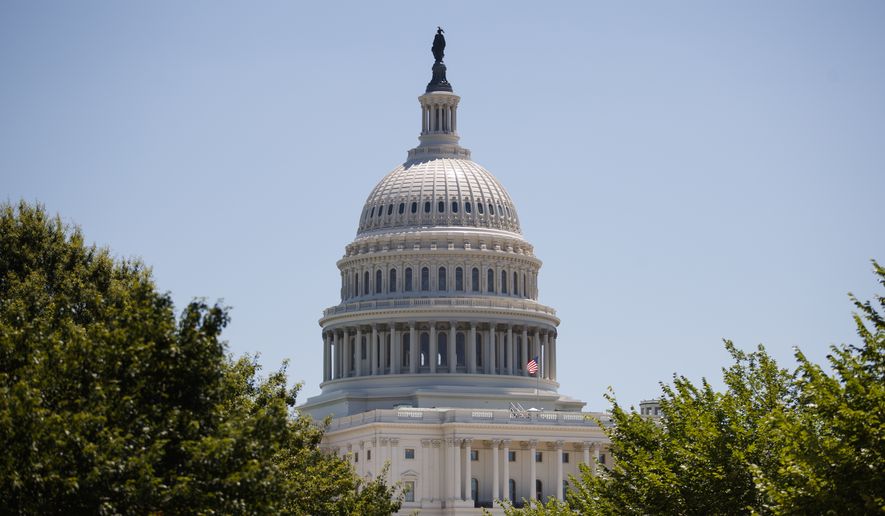Democrats are facing a slew of budget and spending deadlines in early December as they struggle to finalize President Biden’s multitrillion-dollar social welfare and climate change bill.
Both the House and Senate are scheduled to leave Washington for a holiday break starting on Dec. 10, giving lawmakers just over four weeks to finalize and pass the defense authorization act, legislation to fund the government and potentially another hike to the federal debt ceiling.
Completing those priorities in just three weeks would be daunting for any Congress, let alone one wracked by intraparty fighting between progressive and moderate Democrats.
“It’s going to be a train wreck,” said Senate Minority Whip John Thune, South Dakota Republican.
Democrats say the slow pace of the Senate, coupled with the chamber being split 50-50, means there are no easy solutions.
“It takes three days to vote to break a filibuster,” said one Democratic aide, who requested anonymity. “Then you have hours of debate and votes on amendments … It all adds up, for a big piece of legislation it could take a week or longer for it to pass, provided the other side is willing to acquiesce.”
At the moment, the willingness of Republicans to pass several pieces of the outstanding legislation remains up in the air. GOP lawmakers are likely to back a short-term funding measure to avert a government shutdown on Dec. 3, much like they did earlier this year.
“I think we’ll either do a short-term [measure] maybe up to Christmas … or we will kick it on until February,” said Rep. Richard Shelby, Alabama Republican.
The only way Republicans do not back a bill to fund the government is if Democrats again attempt to attach a provision raising the federal debt limit. Democratic leaders attempted to do exactly that earlier this year, putting the country on the brink of defaulting on its debt.
Senate Minority Leader Mitch McConnell, Kentucky Republican, was able to avert a default by striking a deal with Democrats on a short-term debt limit hike.
Mr. McConnell has ruled out doing so again, arguing that Democrats can deal with the debt ceiling unilaterally using budget reconciliation. The process, which Democrats plan to use to pass Mr. Biden’s social welfare package, allows some spending and tax measures to avoid a filibuster and pass with a simple majority of 51 votes.
Democrats, for their part, have ruled out hiking the debt ceiling on their own. Even if GOP leadership opts to strike another deal on the debt limit with Democrats, the initial fight on the topic will only take up time Democrats cannot afford.
The time crunch has Democrats fearful that the centerpiece of Mr. Biden’s domestic agenda, the multitrillion-dollar social welfare bill, will fall by the wayside. After nearly 11 months of negotiating, the mammoth piece of legislation is still no closer to being finalized.
Last week, House Speaker Nancy Pelosi’s push to pass the measure was upended by a cadre of moderates from her own Democratic majority.
The moderates, led by Democratic Rep. Josh Gottheimer of New Jersey, said they would be unable to vote for the more than 2,000-page bill until its cost can be ascertained by the Congressional Budget Office.
“The responsible thing to do when you get a piece of legislation like this is to do a full analysis and to understand the impact on your district and the families in your district and that’s what I’m looking at,” Mr. Gottheimer said.
An in-depth CBO analysis could take weeks, however. The nonpartisan federal agency is attempting to expedite the process by releasing independent cost estimates of various provisions, but it remains unknown how long it will take to have a full breakdown of the bill.
“We anticipate releasing estimates for individual titles of the bill as we complete them, some of which will be released this week. Other estimates will take longer,” said CBO Director Phillip Swagel.
Republicans say that anything short of a full cost estimate for the bill will be insufficient.
Some also argue that the true price tag will remain unknown because Democrats are pledging to make permanent the entitlement programs that the bill only funds for a short period of time.
“Washington Democrats are using budget gimmicks to deceive the American people about the real cost of their agenda,” said Rep. Jason Smith of Missouri, the top Republican on the House Budget Committee.
Whatever social welfare bill is passed by the House will be dead on arrival in the Senate, where Democratic Sens. Joe Manchin III of West Virginia and Kyrsten Sinema of Arizona hold the balance of power.
Both lawmakers have increasingly groaned about the size and scope of the bill. Given that legislation will pass on a party-line vote, their influence will be pivotal.
• Haris Alic can be reached at halic@washingtontimes.com.




Please read our comment policy before commenting.